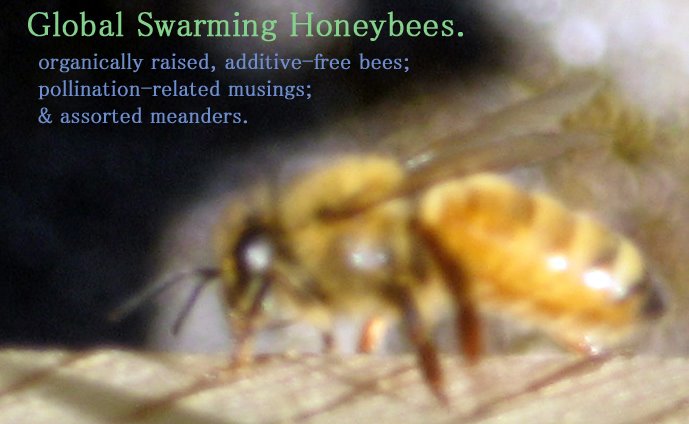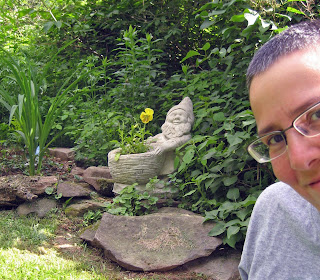The New York Times has just published a quite wonderful, and mournful, meditation on the lost flora of New York City by the Executive Director of N.Y.C. Wildflower Week.
I highly recommend taking a look, whether or not you live in NYC, as a motivating meditation on the importance of finding ways, large and small, to help replenish and restore this battered world.
3.28.2011
Wildflowers as Mirrors
3.05.2010
The (Truly) Great Plains
Feeling a little cooped up this winter? Take a few moments to breathe in some serious beauty....
4.15.2009
The Silence of the Bees
Just a reminder of what's at stake.
1.23.2009
Humans to Trees: Drop Dead
This from an article in the New York Times entitled, Environment Blamed in Western Tree Deaths:
"Rising temperatures and the resulting drought are causing trees in the Western United States to die off at more than twice the pace they did a few decades ago, a new study has found."
Of course, the environmental issues contributing to the trees' problems—drought, rising temperatures, extended summer weather—might just possibility have something to do with human behavior. So I'd have framed the headline somewhat differently; it seems the environment is being wrongly accused here.
8.18.2008
NRDC Takes EPA to Task
Mounting evidence that pesticides are implicated in Colony Collapse Disorder certainly hasn't moved the EPA to action (not that EPA is doing much of anything these days). Under Bush&Co., the EPA has transmuted from Environmental Protection Agency to Enabling Polluters...Again (or might that be Entirely Pathetic Always? I'm sure there's no end to the unflattering acronyms we can apply in this instance; feel free to post a comment suggesting your own).
EPA Buzz Kill: Is the Agency Hiding Colony Collapse Disorder Information? NRDC Forced to Sue to Get Public Records on Bee MysteryWASHINGTON, DC (August 18, 2008) – The Natural Resources Defense Council filed a lawsuit today to uncover critical information that the US government is withholding about the risks posed by pesticides to honey bees. NRDC legal experts and a leading bee researcher are convinced that the US Environmental Protection Agency (EPA) has evidence of connections between pesticides and the mysterious honey bee die-offs reported across the country. The phenomenon has come to be called “colony collapse disorder,” or CCD, and it is already proving to have disastrous consequences for American agriculture and the $15 billion worth of crops pollinated by bees every year.EPA has failed to respond to NRDC’s Freedom of Information Act request for agency records concerning the toxicity of pesticides to bees, forcing the legal action.“Recently approved pesticides have been implicated in massive bee die-offs and are the focus of increasing scientific scrutiny,” said NRDC Senior Attorney Aaron Colangelo. “EPA should be evaluating the risks to bees before approving new pesticides, but now refuses to tell the public what it knows. Pesticide restrictions might be at the heart of the solution to this growing crisis, so why hide the information they should be using to make those decisions?”
5.15.2008
1
Global Swarming Honeybees turns 1 year old today. Thanks much for your visits, your comments, your support. Feel free to share article ideas, requests, resources, and desires for year 2.
In the meantime, let us meditate HARD upon the following—as if, like the Buddhists say, our heads were on fire:
"When you're walking down the street and see a little flower popping up through a crack in the sidewalk—are you going to root for the flower or the pavement?"
—eco-hero Mark Massara




12.30.2007
Thoughts for the New Year

I've just started E.O. Wilson's new book, The Creation, an urgent plea from a Pulitzer Prize-winning biologist to protect biodiversity by finding common ground between the "science community" and the "religious community" in order to halt the biological holocaust before it is too late. It's now or never, folks, and Wilson makes the case in potent terms.
The book is written in the form of a letter to a pastor, illuminating the intertwingular zone where spiritual belief, respect for the natural world, and science connect. Some passages of interest from the first few pages:
"According to archaeological evidence, we strayed from Nature with the beginning of civilization roughly ten thousand years ago. That quantum leap beguiled us with an illusion of freedom from the world that has given us birth. It nourished the belief that the human spirit can be molded into something new to fit changes in the environment and culture, and as a result the timetables of history desynchronized. A wiser intelligence might now truthfully say of us at this point: here is a chimera, a new and very odd species come shambling into our universe, a mix of Stone Age emotion, medieval self-image, and godlike technology. The combination makes the species unresponsive to the forces that count most for its own long-term survival."
***
"Even if the rest of life is counted of no value beyond the satisfaction of human bodily needs, the obliteration of Nature is a dangerous strategy. For one thing, we have become a species specialized to eat the seeds of four kinds of grass—wheat, rice, corn, and millet. If these fail, from disease or climate change, we too shall fail. Some fifty thousand wild plant species (many of which face extinction) offer alternative food sources. If one insists on being thoroughly practical about the matter, allowing these and rest of the wild species to exist should be considered part of a portfolio of long-term investment. Even the most recalcitrant people must come to view conservation as simple prudence in the management of Earth's natural economy. Yet few have begun to think that way at all."
***
"Granted, many people seem content to live entirely within the synthetic ecosystems. But so are domestic animals content, even in the grotesquely abnormal habitats in which we rear them. This in my mind is a perversion. It is not the nature of human beings to be cattle in glorified feedlots. Every person deserves the option to travel easily in and out of the complex and primal world that gave us birth. We need freedom to roam across land owned by no one but protected by all, whose unchanging horizon is the same that bounded the world of our millennial ancestors. Only in what remains of Eden, teeming with life forms independent of us, is it possible to experience the kind of wonder that shaped the human psyche at its birth."
—E.O. Wilson, The Creation: An Appeal to Save Life on Earth
Listen to an interview with Wilson on NPR or check out this televised interview on PBS's Religion & Ethics NewsWeekly.
9.03.2007
more on mountains
A few days ago, we discussed the insane practice of mountaintop removal. It's an unforgivable form of true ecoterrorism being actively promoted, supported, and enabled by, you guessed it, our current "administration."
The letters in the Times this week are so eloquent on the topic at hand, I felt the need to share them here.
8.14.2007
17%
Verlyn Klinkenborg has a good piece in The New York Times about what's left of the ecosystem and our "role" in caretaking, stewarding, and/or leaving it be. His thoughts on the nature of nature and the nature of our dumb ideas about nature are right on.
Here's an outtake, but I recommend the whole piece:
It is certainly possible to make wiser and wiser decisions about how to live, but what if the world we make our choices in becomes, in natural terms, steadily poorer and less diverse? More and more, we find ourselves choosing only among the consequences of regrettable choices we made before.
Humans are competent to do many things. But I do not think we are competent to run a global ecosystem. Something has been irretrievably lost by the time we begin to believe that we can manage nature for people. The essence of nature is that it is not “for people.”
My lack of faith in humans as global managers isn’t just a philosophical conclusion. It is based on the sorry, sorry evidence. The fact is that we have begun to run the global ecosystem already and are doing a terrible job of it.
To put it mildly....anyway, read the piece. Then go out there and so something about it.






